Managing Oneself — a REVOLUTION in human affairs *
a Harvard Business Review Classic ↑ Amazon link
by Peter Drucker — his other books
top of the food-chain
Explore to the contents outline
before exploring the
ecological reality which surrounds you ↓

You are the CEO of your life and nobody is going to do it for you
(elaboration half way down this page).
To be an effective CEO of your life you need to be repeatedly identifying the evolving horizons that you will work toward while avoiding the prison of the past.
Are you aiming toward responsibility for an entire organization, a broad area of responsibility within an organization (a knowledge executive), an individual knowledge contributor or something else? Are you depending on one organization? (big mistake) continue
Whatever path you decide to pursue (for the time being), remember what Drucker said about living in more than one world ↓
“The—I wouldn’t say happy people but satisfied, contented—people I knew were more people that lived in more than one world.
Those single-minded people—you meet them most in politics—in the end are very unhappy people.”
“He added that there is little room at the pinnacle, and it is difficult to last long at the top.” continue

Post-Capitalist executive interview — A MAJOR work-life brainroad !!!!!

This page is an action thoughtscape and brainroad toward a genuinely interesting life and
possibly a significant and meaningful life — not just another life-killing job.
Every thought fragment or brain address you encounter ↑ ↓ can be explored
by asking: “What does this mean for me?” and exploratory thinking (PMI)
Click on either side of the image below to see a larger view
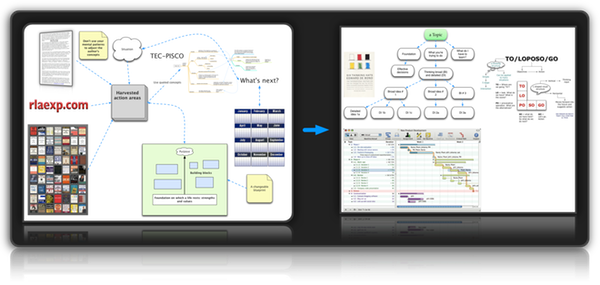
This process ↑ is “prototyped” further down the page: Just reading is not enough
… Other than the process above ↑
there are no permanent answers here or anywhere else ↓
It is up to you to find and travel your own pathS through life and time (1914 … 2050)
without relying on any one organization …
@Pew Research Center ::: @Project Syndicate ::: @TheEconomist ::: @FT ::: The Long Shadow of WW I
Calendarization©: The process of working something out in time … Operacy:
the thinking that goes into doing …

“History’s great achievers—a Napoleon, a da Vinci, a Mozart have always managed themselves.
That, in large measure, is what makes them great achievers.
But they are rare exceptions, so unusual both in their talents and their accomplishments as to be considered outside the boundaries of ordinary human existence.
Now, most of us, even those of us with modest endowments, will have to learn to manage ourselves.”continues further down the page

Reality reminder ↓
It is impossible to work on things ↑ that aren’t on one’s mental radar
and THE future is not on anyone’s radar ↓ ever.
You may have to go looking for your future, but with something different
from a job-centric world-view ↓.
❡ ❡ ❡
The memo they don’t want you to see is the mothership
for this page — navigating a world moving toward unimagined futureS. If you scroll through it you’ll have a broader awareness.
The first and last parts of this page plus the memo page
provide some context within which “oneself” exists.
A foundational concept ↓
taking more responsibility for oneself and
not depending on any one company continue

Throughout one’s life
it is impossible to work on things and
exploit opportunities ↓ that aren’t on your mental radar.
The most natural tendency is to become a prisoner of the past

@Pew Research Center ::: @Project Syndicate ::: @TheEconomist ::: @FT ::: The Long Shadow of WW I
Today is not just an extrapolated version of 1920, 1930, 1950, 1970, 1990 and so on.
Tomorrow is not going to be an extrapolation of today and day after tomorrow won’t be an extrapolation of tomorrow.
Your friends, acquaintances and role models are as vulnerable (to the curve-ballS that change throws at us) as anyone else and they don’t really believe it because it ain’t on their radar until it happens to them — then it’s too late.
Before reading further, stop and reflect on where you acquired your understanding of the individual’s role in the universe of work. In my own experience with thousands of people, I haven’t seen anyone who apparently ever gave it a moment’s thought. Where do you think your bosses acquired their understanding?
❡ ❡ ❡
Peoples opinions and attitudes about their jobs change the minute the job is gone. They see the ex-job in a completely different light. If they are members of David Allen’s GTD (getting things done) cult, they now see the time they wasted on the wrong things.
The assumption that tomorrow is going to be an extrapolation of yesterday sabotages the future — an organization’s, a community’s and a nation’s future.
The economic and social health of our world depends on our capacity to navigate unimagined futures (and not be prisoners of the past)
That navigation capacity is governed by what’s between our ears. about assumptions
The world you see around you is just a temporary situation.
Things fail at the height of their success …
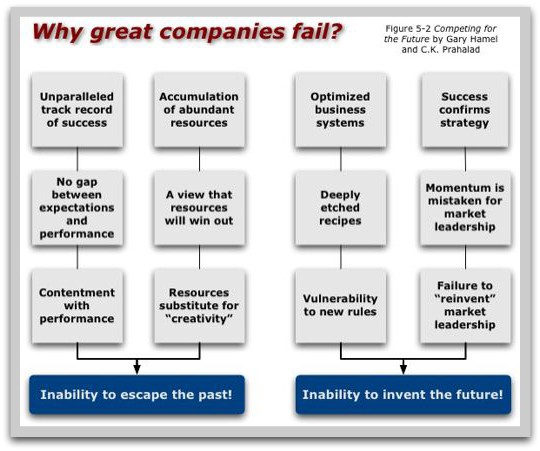
People at each of these organizations ↑ ↓ think they are doing fine. They
act — mis-act — on this assumption …
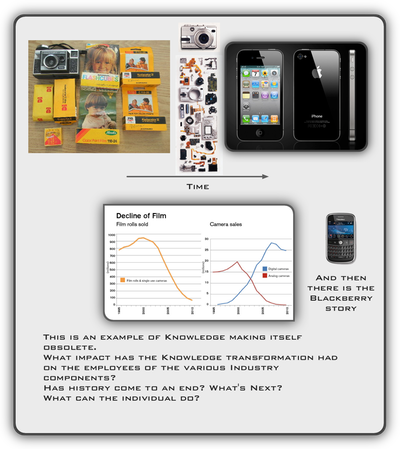
larger view ↑
“Corporations once built to last like pyramids
are now more like tents.
Tomorrow they’re gone or in turmoil.”

Nothing would change if somebody somewhere wasn’t doing something new and different, but this change doesn’t necessarily have to be an extrapolation of something that already exists.
↑ And then … ↓
“I am often asked whether I am an optimist or a pessimist.
For any survivor of this century to be an optimist would be fatuous.
We surely are nowhere near the end of the turbulences, the transformations, the sudden upsets, which have made this century one of the meanest, cruelest, bloodiest in human history.” Unimagined futureS
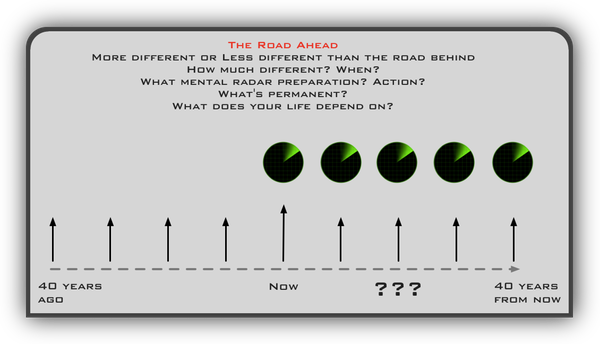
larger version ↑ ::: Realities
“The same forces which destroyed Marxism as an ideology and Communism as a social system are, however, also making Capitalism obsolescent …
... snip, snip ...
The basic economic resource—“the means of production,” to use the economist’s term—is no longer capital, nor natural resources (the economist’s “land”), nor “labor.”
It is and will be knowledge. (NOT education system courses)
The central wealth-creating activities will be neither the allocation of capital to productive uses, nor “labor”—the two poles of nineteenth- and twentieth-century economic theory, whether classical, Marxist, Keynesian, or neo-classical.
Value is now created by “productivity” and “innovation,” both applications of knowledge to work.”
... snip, snip ...
“That knowledge has become the resource,
rather than a resource,
is what makes our society “post-capitalist.”
This fact changes—fundamentally—the structure of society.
It creates new social and economic dynamics.
It creates new politics.
... snip, snip ...
“It is the very nature of knowledge
that it changes fast and
that today’s certainties
will be tomorrow’s absurdities” — Peter Drucker
... snip, snip ...
“The productivity of knowledge is going to be
the determining factor in the competitive position
of a company, an industry, an entire country” — PFD

“The world ain’t what it seems … The moment
you think you’ve got it figured out you’re wrong.”

Everybody needs a mentor and
Peter Drucker is as good as it gets — “top of the food chain”
“No human being continue
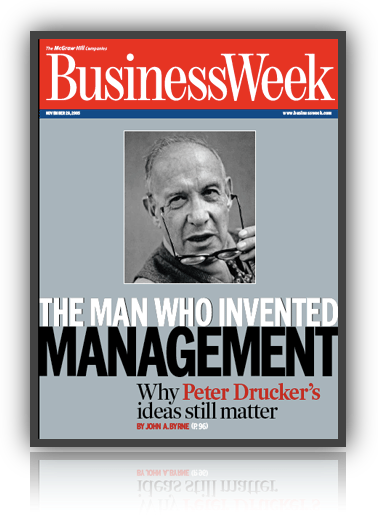
To get a better appreciation of Drucker’s mental landscape see the prefaces, introduction, etc in his toward tomorrows books and time books.
Amazon.com link: Managing Oneself (Harvard Business Review Classics) 
This page is not a comprehensive guide to life in a dynamic changing world.
It is one of 500+ pages on this site.
This page presents an introductory brainscape for work life awareness and its complexity. A more comprehensive thoughtscape: the memo they don’t want you to read.

The core managing oneself journey begins ↓
History’s great achievers—a Napoleon, a da Vinci, a Mozart have always managed themselves.
That, in large measure, is what makes them great achievers.
But they are rare exceptions, so unusual both in their talents and their accomplishments as to be considered outside the boundaries of ordinary human existence.
Now, most of us, even those of us with modest endowments, will have to learn to manage ourselves.
We will have to learn to develop ourselves.
Will have to place ourselves where we can make the greatest contribution.
And we will have to stay mentally alert and engaged during a 50-year working life, which means knowing how and when to change the work we do.

Horizons ↓
Intelligence and behavior ↑ ↓ ← Niccolò Machiavelli ↑ ↓

Successful careers are not planned and cannot be … ↓
Job positions are not permanent ↓ — try searching this page for “position”

larger view ↑
They develop when people are prepared for opportunities because they know their strengths, their method of work, and their values.
Knowing where one belongs can transform an ordinary person—hardworking and competent but otherwise mediocre—into an outstanding performer.
… snip, snip …
The emerging society of knowledge and knowledge workers
… snip, snip …
The society of organizations — elements and characteristics
… snip, snip …
The conclusion bears repeating: Do not try to change yourself—you are unlikely to succeed.
But work hard to improve the way you perform. (calendarize this?)
And try not to take on work you cannot perform or will only perform poorly. — Peter Drucker (calendarize this)

Reading entirely through this page without clicking many links
may be the best initial approach.
Content of Managing Oneself
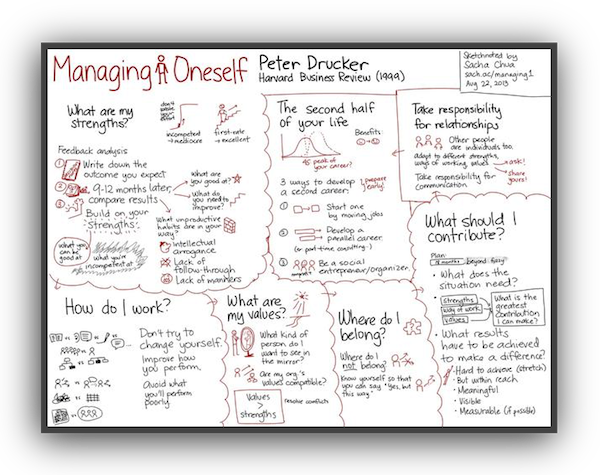
larger version
Reprise … Now, most of us, even those of us with modest endowments, will have to learn to manage ourselves.
We will have to learn to develop ourselves.
Will have to place ourselves where we can make the greatest contribution.
“You must take integrating responsibility
for putting yourself into the big picture.”
An idea outside of yourself
What position in the world (not some organization) are you aiming for?
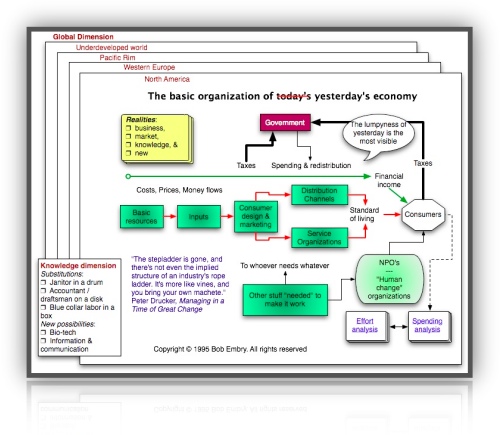
More economic landscape vistas
↑ essential for exploring where you belong
And we will have to stay mentally alert and engaged during a 50-year working life, which means knowing how and when to change the work we do.
The First Technological Revolution and Its Lessons
Luther, Machiavelli, and the Salmon
The Lessons of History
“To know something,
to really understand something important,
one must look at it from sixteen different angles.
People are perceptually slow,
and there is no shortcut to understanding;
it takes a great deal of time.” read more
Competing patterns are necessary ↑ ↓
Thought-scapes ↓ are needed to prevent oneself from being blinded by the familiar and unable to see the unfamiliar
Fortune favors the prepared mind ↓

@Pew Research Center ::: @Project Syndicate ::: @TheEconomist ::: @FT ::: The Long Shadow of WW I
Peter Drucker (a social ecologist) → he liberated me
Drucker: The Man Who Invented the Corporate Society
One can … never be sure what the knowledge worker thinks—and yet thinking is her/his specific work; it is his/her “doing.” — pfd

An excellent starting background — Josh Abrams horizons
Chapters, headings and notes
 History’s great achievers continue History’s great achievers continue
 Learning to manage oneself continue Learning to manage oneself continue
Working with questions
 What Are My Strengths? (here) What Are My Strengths? (here)
bobembry’s caution: strengths can’t be discovered by taking a test or reading a book. What sports coach would select potential players based a test? “Just show me the performance” — and even that may be suspect. HR performance reports almost never reveal performance
 Feedback analysis Feedback analysis
The only way to discover your strengths is through feedback analysis.
Whenever you make a key decision or take a key action, write down what you expect will happen.
Nine or 12 months later, compare the actual results with your expectations.
I have been practicing this method for 15 to 20 years now, and every time I do it, I am surprised.
The feedback analysis showed me, for instance—and to my great surprise—that I have an intuitive understanding of technical people, whether they are engineers or accountants or market researchers.
It also showed me that I don’t really resonate with generalists.
Feedback analysis is by no means new.
It was invented sometime in the fourteenth century by an otherwise totally obscure German theologian and picked up quite independently, some 150 years later, by John Calvin and Ignatius of Loyola, each of whom incorporated it into the practice of his followers.
In fact, the steadfast focus on performance and results that this habit produces explains why the institutions these two men founded, the Calvinist church and the Jesuit order, came to dominate Europe within 30 years.
Practiced consistently, this simple method will show you within a fairly short period of time, maybe two or three years, where your strengths lie—and this is the most important thing to know.
The method will show you what you are doing or failing to do that deprives you of the full benefits of your strengths.
It will show you where you are not particularly competent.
And finally, it will show you where you have no strengths and cannot perform.
 Action implications Action implications
Several implications for action follow from feedback analysis.
First and foremost, concentrate on your strengths.
Put yourself where your strengths can produce results.
Second, work on improving your strengths.
Analysis will rapidly show where you need to improve skills or acquire new ones.
It will also show the gaps in your knowledge and those can usually be filled.
Mathematicians are born, but everyone can learn trigonometry.
Third, discover where your intellectual arrogance is causing disabling ignorance and overcome it.
Far too many people—especially people with great expertise in one area—are contemptuous of knowledge in other areas or believe that being bright is a substitute for knowledge.
First-rate engineers, for instance, tend to take pride in not knowing anything about people.
Human beings, they believe, are much too disorderly for the good engineering mind.
Human resources professionals, by contrast, often pride themselves on their ignorance of elementary accounting or of quantitative methods altogether.
But taking pride in such ignorance is self-defeating.
Go to work on acquiring the skills and knowledge you need to fully realize your strengths.
It is equally essential to remedy your bad habits—the things you do or fail to do that inhibit your effectiveness and performance.
Such habits will quickly show up in the feedback.
For example, a planner may find that his beautiful plans fail because he does not follow through on them.
Like so many brilliant people, he believes that ideas move mountains.
But bulldozers move mountains; ideas show where the bulldozers should go to work.
This planner will have to learn that the work does not stop when the plan is completed.
He must find people to carry out the plan and explain it to them.
He must adapt and change it as he puts it into action.
And finally, he must decide when to stop pushing the plan.
At the same time, feedback will also reveal when the problem is a lack of manners.
Manners are the lubricating oil of an organization.
It is a law of nature that two moving bodies in contact with each other create friction.
This is as true for human beings as it is for inanimate objects.
Manners—simple things like saying “please” and “thank you” and knowing a person’s name or asking after her family—enable two people to work together whether they like each other or not.
Bright people, especially bright young people, often do not understand this.
If analysis shows that someone’s brilliant work fails again and again as soon as cooperation from others is required, it probably indicates a lack of courtesy—that is, a lack of manners.
Comparing your expectations with your results also indicates what not to do.
We all have a vast number of areas in which we have no talent or skill and little chance of becoming even mediocre.
In those areas a person—and especially a knowledge worker—should not take on work, jobs, and assignments.
One should waste as little effort as possible on improving areas of low competence.
It takes far more energy and work to improve from incompetence to mediocrity than it takes to improve from first-rate performance to excellence.
And yet most people—especially most teachers and most organizations—concentrate on making incompetent performers into mediocre ones.
Energy, resources, and time should go instead to making a competent person into a star performer.
 How Do I Perform? (here) How Do I Perform? (here)
How do I work to achieve results?
 Other questions Other questions
 Alone or with others—in what relationship? Alone or with others—in what relationship?
 Decision maker or advisor Decision maker or advisor
 What kind of work environment? What kind of work environment?
 Conclusion Conclusion
 What Are My Values? What Are My Values?
… snip, snip …
To be able to manage yourself, you finally have to ask, What are my values?
This is not a question of ethics.
With respect to ethics, the rules are the same for everybody, and the test is a simple one.
I call it the “mirror test.”
… snip, snip …
What is ethical behavior in one kind of organization or situation is ethical behavior in another.
But ethics is only part of a value system—especially of an organization’s value system.
To work in an organization whose value system is unacceptable or incompatible with one’s own condemns a person both to frustration and to nonperformance.
… snip, snip …
Value conflicts are not limited to business organizations.
… snip, snip …
Organizations, like people, have values.
To be effective in an organization, a person’s values must he compatible with the organization’s values.
They do not need to he the same, but they must be close enough to coexist.
Otherwise, the person will not only be frustrated but also will not produce results.
… snip, snip …
A person’s strengths and the way that person performs rarely conflict; the two are complementary.
But there is sometimes a conflict between a person’s values and his or her strengths.
What one does well—even very well and successfully—may not fit with one’s value system.
In that case, the work may not appear to be worth devoting one’s life to (or even a substantial portion thereof).
… snip, snip …
Values, in other words, are and should be the ultimate test.
 Where Do I Belong? Where Do I Belong?
The answers to the three questions:
“What are my strengths?
How do I perform?
What are my values?”
should enable the individual, and especially the individual knowledge worker, to decide where he or she belongs.
This is not a decision that most people can or should make at the beginning of their careers.
To be sure, a small minority know very early where they belong.
Mathematicians, musicians or cooks, for instance are usually mathematicians, musicians or cooks by the time they are four or five years old.
Physicians usually decide in their teens, if not earlier.
But most people, and especially highly gifted people, do not really know where they belong till they are well past their mid-twenties.
By that time, however, they should know where their strengths are.
They should know how they perform.
And they should know what their values are. ¶¶¶
And then they can and should decide where they belong.
Or rather, they should be able to decide where they do not belong.
The person who has learned that he or she does not really perform in a big organization should have learned to say “no” when offered a position in a big organization.
The person who has learned that he or she is not a decision maker should have learned to say “no” when offered a decision-making assignment.
A General Patton (who probably himself never learned it) should have learned to say “no” when offered an independent command, rather than a position as a high-level subordinate.
But also knowing the answer to these three questions enables people to say to an opportunity, to an offer, to an assignment:
“Yes, I’ll do that.
But this is the way I should be doing it.
This is the way it should be structured.
This is the way my relationships should be.
These are the kind of results you should expect from me, and in this time frame, because this is who I am.”
Successful careers are not “planned.”
They are the careers of people who are prepared for the opportunity because they know their strengths, the way they work and their values.
For knowing where one belongs makes ordinary people—hardworking, competent but mediocre otherwise—into outstanding performers. ¶¶¶
sidebar ↓
From Interview: Post-Capitalist Executive ↓
Even today, remarkably few Americans are prepared to select jobs for themselves.
When you ask, “Do you know what you are good at?
Do you know your limitations?” they look at you with a blank stare.
Or they often respond in terms of subject knowledge, which is the wrong answer.
Knowledge specialization (research)
About knowledge ::: connecting ::: not connecting
When they prepare their resumes, they still try to list positions like steps up a ladder.
It is time to give up thinking of jobs or career paths as we once did and think in terms of taking on assignments one after the other.
Q: If a young man in a gray flannel suit represented the lifelong corporate type, what’s today’s image?
A: Taking individual responsibility and not depending on any particular company.
Equally important is managing your own career.
The stepladder is gone, and there’s not even the implied structure of an industry’s rope ladder.
It’s more like vines, and you bring your own machete.

You don’t know what you’ll be doing next, or whether you’ll work in a private office or one big amphitheater or even out of your home.
You have to take responsibility for knowing yourself, so you can find the right jobs as you develop and as your family becomes a factor in your values and choices. continue → Interview: Post-Capitalist Executive
 The new job The new job
Promotions don’t automatically provide new magical capabilities. Don’t try to copy a previous boss …
 Information challenges Information challenges
 Managing the boss Managing the boss
A constellation of strategic insight:
A society of organizations and the destabilization they must cause
Knowledge specialty (remember the assignments concepts above)
Aiming high
Making connections and strategic problem solving
From information to responsibility
The Productivity of the New Work Forces and The New-productivity Challenge
… snip, snip …
Performance is not hitting the bull’s-eye with every shot.
Performance is rather the consistent ability to produce results over prolonged periods of time and in a variety of assignments.
A performance record must include mistakes.
It must include failures.
It must reveal a person’s limitations as well as his strengths.
The one person to distrust is the one who never makes a mistake, never commits a blunder, never fails in what he tries to do.
Either he is a phony, or he stays with the safe, the tried, and the trivial.
The better a person is, the more mistakes he will make—for the more new things he will try. — The Daily Drucker
 Background awareness ↓ horizons to consider Background awareness ↓ horizons to consider
 Unless we can learn how to increase the productivity of knowledge workers and service workers, and increase it fast, the developed countries will face economic stagnation and severe social tension. continue Unless we can learn how to increase the productivity of knowledge workers and service workers, and increase it fast, the developed countries will face economic stagnation and severe social tension. continue
 Timescape awareness is essential Timescape awareness is essential
Luther, Machiavelli, and the Salmon; Up to poverty; The Manager and the Moron; The Vanishing East …
 The emerging society of knowledge and knowledge workers The emerging society of knowledge and knowledge workers
 What do you want to be remembered for? What do you want to be remembered for?
 Citizenship through the social sector Citizenship through the social sector
Good intentions ↑ aren’t enough.
You have to define the results you’re after.
There has been a huge expansion in the number of nonprofits and charitable organizations the past several years.
A lot of people want to put their resources to work where they can do the most good.
Unfortunately, as Peter noted, many of them get poor results—or no results.
“The problem,” he said, “is that they don’t ask about results, and they don’t know what results they want in the first place.
They mean well, and they have the best of intentions, but the only thing good intentions are for (as the old maxim says) is to pave the road to hell.”
The best results are achieved, he said, when people ask the right questions and then partner with others who have the expertise, knowledge, and discipline to get the right results. See network society below.
Creating Tomorrow’s Society Of Citizens and Refining the Mission Statement
How to guarantee non-performance
Managing the Non-Profit Organization
Managing Service Institutions in the Society of Organizations ::: Managing Public-Service Institutions For Performance ::: Entrepreneurship in the Public-Service Institution
 The society of organizations — elements and characteristics The society of organizations — elements and characteristics
 Network society Network society
 Conditions for survival Conditions for survival
 Going outside Going outside
 Innovation Innovation
 Making the future → a chance for survival Making the future → a chance for survival
One thing is certain for developed countries—and probably for the entire world:
We face long years of profound changes.
The changes are not primarily economic changes.
They are not even primarily technological changes.
They are changes in demographics, in politics, in society, in philosophy and, above all, in worldview.
... snip, snip ...
Thus it can be confidently predicted that a large number of today’s leaders in all areas, whether business, education or health care, are unlikely still to be around thirty years hence, and certainly not in their present form.
... snip, snip ...
But to try to anticipate the changes is equally unlikely to be successful.
These changes are not predictable.
The only policy likely to succeed is to try to make the future. continue
 The actual results of action are not predictable. The actual results of action are not predictable.
Indeed, if there is one rule for action, and especially for institutional action, it is that the expected results will not be attained.
The unexpected is practically certain.
But are the unexpected results deleterious? Read more
 The future that has already happened The future that has already happened
 The unexpected success The unexpected success
main brainroad continues ↓
… snip, snip …
As this example suggests, it is rarely possible—or even particularly fruitful—to look too far ahead.
A plan can usually cover no more than 18 months and still be reasonably clear and specific.
So the question in most cases should be, Where and how can I achieve results that will make a difference within the next year and a half?
The answer must balance several things.
 Responsibility For Relationships Responsibility For Relationships
 Accepting others as individuals Accepting others as individuals
 Responsibility for communications (it ain’t what you assume — arrogance) Responsibility for communications (it ain’t what you assume — arrogance)
 The boredom challenge The boredom challenge
 Three ways to develop a second career Three ways to develop a second career
 Starting a new one Starting a new one
 The parallel career The parallel career
 The social entrepreneur The social entrepreneur
 Bob Buford Bob Buford
 Josh Abrams story and self-development approach Josh Abrams story and self-development approach
 Ten Principles for Life II Ten Principles for Life II
 Those who manage themselves are the leaders and models for the rest of society Those who manage themselves are the leaders and models for the rest of society
sidebar ↓
 Starting early (age 35) — a prerequisite Starting early (age 35) — a prerequisite
Living in More Than One World
The following Drucker quotation is ↓ from a conversation between Peter Drucker and Bruce Rosenstein
“The—I wouldn’t say happy people but satisfied, contented—people I knew were more people that lived in more than one world.
Those single-minded people—you meet them most in politics—in the end are very unhappy people.
He added that there is little room at the pinnacle, and it is difficult to last long at the top.
The answer is to spread out your time and talents on more than one activity, and to live and work among different groups of people, so that you are not overly reliant on any one thing for your happiness, sense of worth, and so on.
This seemingly simple idea has myriad implications.
For example, if you have a setback in one area it won’t destroy you.
But the idea goes deeper.
By living in more than one world, you constantly meet different people who can enrich your life.
You learn more about how other people think, live, and work.
You can gain different insights into yourself as a person.
You become a more multidimensional person who is not overly dependent on any one particular area of life.
Organization failure
You consider life not as a series of compartments, but as an ongoing series of activities, achievements, and commitments that give you a sense of meaning and fulfilllment.”
More on this theme: the need for community, The Daily Drucker and Living in More Than One World: How Peter Drucker's Wisdom Can Inspire Your Life by Bruce Rosenstein
 Serious setbacks—another motivator Serious setbacks—another motivator
 Summary—A revolution in human affairs Summary—A revolution in human affairs
 You can’t design your life around a temporary organization — Interview: Post-Capitalist Executive from Managing in a Time of Great Change by Peter Drucker You can’t design your life around a temporary organization — Interview: Post-Capitalist Executive from Managing in a Time of Great Change by Peter Drucker

See Managing Knowledge Means Managing Oneself on the Frances Hesselbein Leadership Institute site
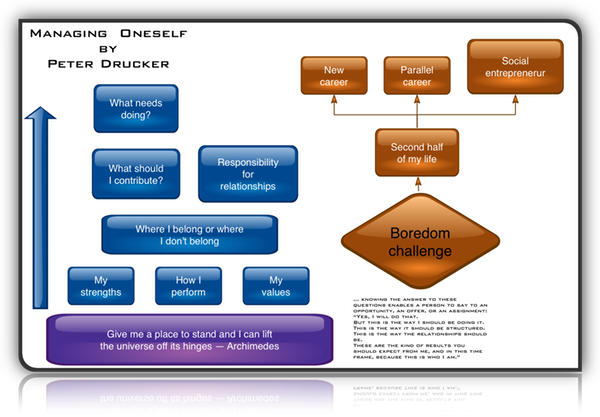
Larger
What needs doing? …
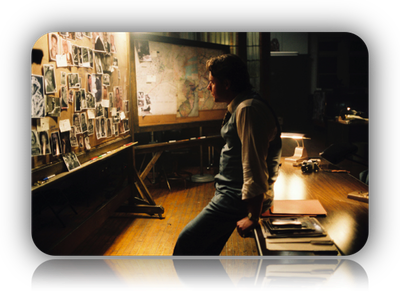
What’s the next ↑ effective action?

Those who want to live a fulfilling life—who want to feel as if there is some purpose in their being on this earth—will have to learn to manage themselves.
They will have to accept the fact that it is their own responsibility to find meaningful work that builds on their strengths and values.
“The World Is Full Of Options”
by Peter Drucker
(be sure to explore the two preceding links ASAP)

Bottom line: We are the CEOs of our lives.
The CEO in the New Millennium
It is up to each of us to develop ourselves.
It is up to each of us to navigate our way through time — 2020, 2040 … in a world moving toward unimagined futures.
One thing leads to something different … which
leads to something different … which leads to
something different …

What Everybody Knows Is Frequently Wrong ::: If You Keep Doing What Worked in the Past You’re Going to Fail ::: Approach Problems with Your Ignorance—Not Your Experience ::: Develop Expertise Outside Your Field to Be an Effective Manager ::: Outstanding Performance Is Inconsistent with Fear of Failure ::: You Must Know Your People to Lead Them ::: People Have No Limits, Even After Failure ::: Base Your Strategy on the Situation, Not on a Formula — A Class With Drucker: The Lost Lessons of the World's Greatest Management Teacher
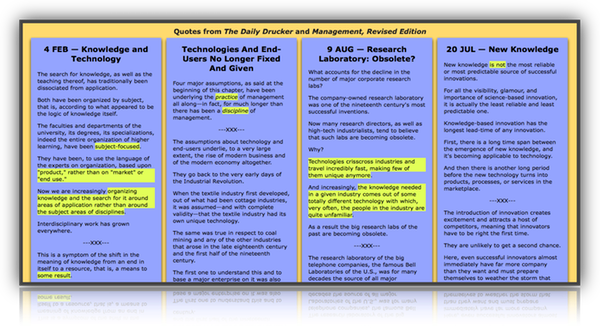
PDF ↑
Don't memorize … calendarize (identify work areas, next actions, and follow-ups in writing—mind maps may be helpful) !!! See harvesting and implementing

larger

From the outside, business can look like “a seemingly mindless game of chance at which any donkey could win provided only that he be ruthless.
But that is of course how any human activity looks to the outsider unless it can be shown to be purposeful, organized, systematic; that is unless it can be presented as the generalized knowledge of a discipline.”
«§§§»
“Indeed, the typical picture of what goes on in the “front office” or on “the fourteenth floor” in the minds of otherwise sane, well-informed and intelligent employees (including, often, people themselves in responsible managerial and specialist positions) bears striking resemblance to the medieval geographer’s picture of Africa as the stamping ground of the one-eyed ogre, the two-headed pygmy, the immortal phoenix and the elusive unicorn.”
«§§§»
“Management, in most business schools, is still taught as a bundle of techniques, such as the technique of budgeting.
To be sure, management, like any other work, has its own tools and its own techniques.
But just as the essence of medicine is not the urinalysis, important though it is, the essence of management is not techniques and procedures.
The essence of management is to make knowledge productive.
Management, in other words, is a social function.
And in its practice, management is truly a “liberal art.” ”
The management revolution

One can … never be sure what the knowledge worker thinks —
and yet thinking is her/his specific work;
it is his/her “doing.” — Peter Drucker
“Planning is frequently misunderstood as making future decisions,
but decisions exist only in the present.”
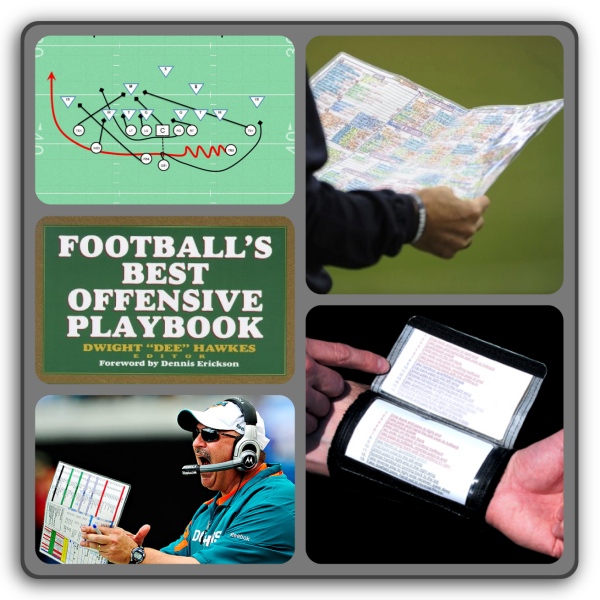
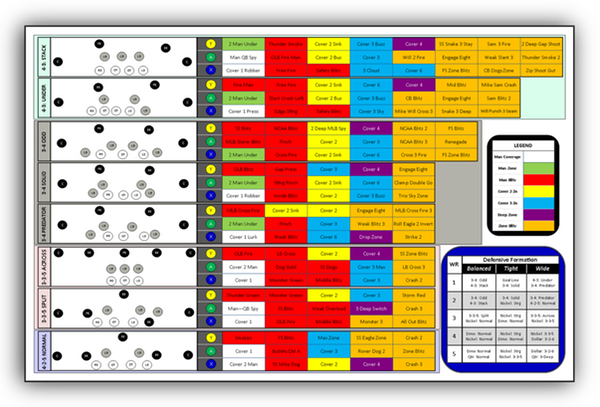
larger ↑
When we are involved in doing something
it is very difficult to switch
to something completely different

“Managers are synthesizers
who bring resources together
and have that ability to “smell ↓” opportunity and timing.
Today perceptiveness is more important than analysis ↑
In the new society of organizations,
you need to be able to recognize patterns
to see what is there
rather than what you expect to see.”
— Interview: Post-Capitalist Executive

The terms knowledge industries, knowledge work and knowledge worker
are nearly fifty years old.
They were coined around 1960, simultaneously but independently—
the first by a Princeton economist, Fritz Machlup,
the second and third by this writer.
Now everyone uses them, but as yet hardly anyone
understands their implications for human values and human behavior,
for managing people and making them productive,
for economics, and for politics.
What is already clear, however, is that the emerging knowledge society
and knowledge economy will be radically different
from the society and economy of the late twentieth century.
Chapter 4, Management, Revised Edition
… “For the major new insights in every one
of the specialized knowledges arise out of another,
separate specialty, out of another one of the knowledges.
Both economics and meteorology are being transformed
at present by the new mathematics of chaos theory.
Geology is being profoundly changed by the physics of matter;
archaeology, by the genetics of DNA typing;
history, by psychological, statistical, and technological analyses
and techniques.” Chapter 48, Management, Revised Edition
Peter observed that we are now in another critical moment:
the transition from the industrial to the knowledge-based economy …
We should expect radical changes in society
as well as in business.
“We haven’t seen all those changes yet,” he added.
Even the very products we buy will change drastically. …
He spent the better part of the next two hours defining and pulling this idea apart
(the application of knowledge to knowledge): the importance of
accessing, interpreting, connecting, and translating knowledge” more …

The Effective Executive
 Important introduction and notes Important introduction and notes
 Book contents Book contents
 Management, Revised Edition Management, Revised Edition
 Drucker’s toward tomorrow books Drucker’s toward tomorrow books
 Drucker’s time books Drucker’s time books
To be reasonably effective it is not enough for the individual to be intelligent, to work hard or to be knowledgeable.
Effectiveness is something separate, something different.
“Men (people) of high effectiveness are conspicuous by their absence in executive jobs.
High intelligence is common enough among executives.
Imagination is far from rare.
The level of knowledge tends to be high.
But there seems to be little correlation between a man’s effectiveness and his intelligence, his imagination, or his knowledge.
Brilliant men are often strikingly ineffectual; they fail to realize that the brilliant insight is not by itself achievement.
They never have learned that insights become effectiveness only through hard systematic work.
Conversely, in every organization there are some highly effective plodders.
While others rush around in the frenzy and busyness which very bright people so often confuse with ‘creativity,’ the plodder puts one foot in front of the other and gets there first, like the tortoise in the old fable.”
“Follow effective action with quiet reflection.
From the quiet reflection will come even more effective action.” — Peter Drucker
“The last twenty years have been very unsettling.
Executives really don’t understand the world they live in” — PFD Forbes
Effective Executive Contents

What Makes An Effective Executive?
… a brief introduction from Peter F. Drucker’s work
An effective executive does not need to be a leader in the sense that the term is now most commonly used.
Harry Truman did not have one ounce of charisma, for example, yet he was among the most effective chief executives in US. history.
Similarly, some of the best business and nonprofit CEOs I’ve worked with over a 65-year consulting career were not stereotypical leaders.
They were all over the map in terms of their personalities, attitudes, values, strengths, and weaknesses.
They ranged from extroverted to nearly reclusive, from easy-going to controlling, from generous to parsimonious.
What made them all effective is that they followed the same eight practices:
1. They asked, “What needs to be done?”
The answer to the question “What needs to be done?” almost always contains more than one urgent task.
But effective executives do not splinter themselves.
They concentrate on one task if at all possible.
If they are among those people—a sizable minority—who work best with a change of pace in their working day, they pick two tasks.
I have never encountered an executive who remains effective while tackling more than two tasks at a time.
Hence, after asking what needs to be done, the effective executive sets priorities and sticks to them.
For a CEO, the priority task might be redefining the company’s mission.
For a unit head, it might be redefining the unit’s relationship with headquarters.
Other tasks, no matter how important or appealing, are postponed.
However, after completing the original top-priority task, the executive resets priorities rather than moving on to number two from the original list.
He asks, “What must be done now?”
This generally results in new and different priorities.
… But Welch also thought through another issue before deciding where to concentrate his efforts for the next five years.
He asked himself which of the two or three tasks at the top of the list he himself was best suited to undertake.
Then he concentrated on that task; the others he delegated.
Effective executives try to focus on jobs they’ll do especially well.
They know that enterprises perform if top management performs—and don’t if it doesn’t.
2. They asked, “What is right for the enterprise?”
Effective executives’ second practice—fully as important as the first—is to ask, “Is this the right thing for the enterprise?”
They do not ask if it’s right for the owners, the stock price, the employees, or the executives.
Of course they know that shareholders, employees, and executives are important constituencies who have to support a decision, or at least acquiesce in it, if the choice is to be effective.
They know that the share price is important not only for the shareholders but also for the enterprise, since the price/earnings ratio sets the cost of capital.
But they also know that a decision that isn’t right for the enterprise will ultimately not be right for any of the stakeholders.
3. They developed action plans.
4. They took responsibility for decisions.
5. They took responsibility for communicating.
6. They were focused on opportunities rather than problems.
7. They ran productive meetings.
8. They thought and said “we” rather than “I.”
The first two practices gave them the knowledge they needed.
The next four helped them convert this knowledge into effective action.
The last two ensured that the whole organization felt responsible and accountable.
We’ve just reviewed eight practices of effective executives.
I’m going to throw in one final, bonus practice.
This one’s so important that I’ll elevate it to the level of a rule: Listen first, speak last.

Just reading is not enough … #ams
Concepts have to be converted into daily action
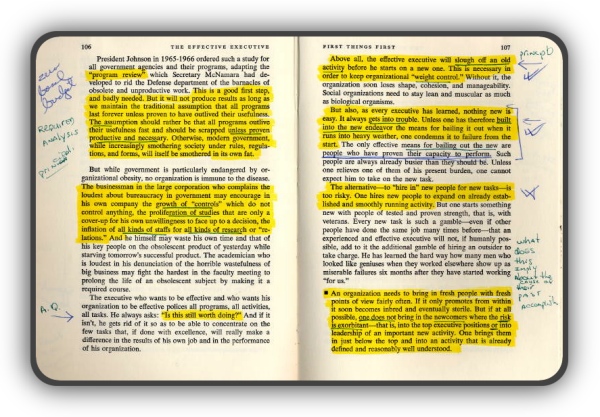
Harvesting and action thinking are needed …
Managing oneself should be the action foundation
You can select and note areas of interest. You can employ what does this mean for me? (illustration) with the PMI, dense reading and dense listening plus thinking broad and thinking detailed with operacy to see where that takes you. The potential effectiveness of our thinking depends on our existing mental landscape → see experts speak. What’s the next effective action?
Concept acquisition → action conversion → click image ↓
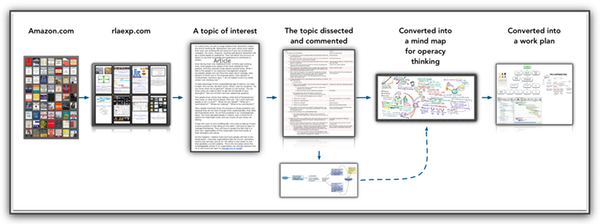
When we are involved in doing something, it is very difficult
to look outside that involvement — even when our future depends on it.
Additionally, everything eventually outlives its usefulness continue
And now for the rest of the story

Quotes from Managing Oneself
… snip, snip …
What Are My Strengths?
Most people think they know what they are good at.
They are usually wrong.
People know what they are not good at more often—and even there people are more often wrong than right.
And yet, one can only perform with one’s strengths.
One cannot build performance on weaknesses, let alone on something one cannot do at all.
For the great majority of people, to know their strengths was irrelevant only a few decades ago.
One was born into a job and into a line of work.
The peasant’s son became a peasant.
If he was not good at being a peasant, he failed.
The artisan’s son was similarly going to be an artisan, and so on.
But now people have choices.
They therefore have to know their strengths so that they can know where they belong.
There is only one way to find out: The Feedback Analysis.
Whenever one makes a key decision, and whenever one does a key action, one writes down what one expects will happen.
And nine months or twelve months later one then feeds back from results to expectations.
I have been doing this for some fifteen to twenty years now.
And every time I do it I am surprised.
And so is everyone who has ever done this.
This is by no means a new method.
It was invented sometime in the 14th century, by an otherwise totally obscure German theologian.
Some 150 years later Jean Calvin in Geneva (1509-1564), father of Calvinism, and Ignatius Loyola (1491-1556), the founder of the Jesuit Order, quite independent of each other, picked up the idea and incorporated it into their rules for every member of their groups, that is, for the Calvinist pastor and the Jesuit priest.
This explains why these two new institutions (both founded in the same year, in 1536) had come within thirty years to dominate Europe: Calvinism the Protestant north; the Jesuit Order the Catholic south.
By that time each group contained so many thousands of members that most of them had to be ordinary rather than exceptional.
Many of them worked alone, if not in complete isolation.
Many of them had to work underground and in constant fear of persecution.
Yet very few defected.
The routine feedback from results to expectations reaffirmed them in their commitment.
It enabled them to focus on performance and results, and with it, on achievement and satisfaction.
Within a fairly short period of time, maybe two or three years, this simple procedure will tell people first where their strengths are—and this is probably the most important thing to know about oneself.
It will show them what they do or fail to do that deprives them of the full yield from their strengths.
It will show them where they are not particularly competent.
And it will finally show them where they have no strengths and cannot perform.
Several action conclusions follow from the feedback analysis.
The first, and most important, conclusion: Concentrate on your strengths.
Place yourself where your strengths can produce performance and results.
Second: Work on improving your strengths.
The feedback analysis rapidly shows where a person needs to improve skills or has to acquire new knowledge.
It will show where skills and knowledge are no longer adequate and have to be updated.
It will also show the gaps in one’s knowledge.
And one can usually acquire enough of any skill or knowledge not to be incompetent in it.
Mathematicians are born.
But almost everyone can learn trigonometry.
And the same holds for foreign languages or for major disciplines, whether history or economics or chemistry.
Of particular importance is the third conclusion: the feedback analysis soon identifies the areas where intellectual arrogance causes disabling ignorance.
Far too many people—and especially people with high knowledge in one area—are contemptuous of knowledge in other areas or believe that being “bright” is a substitute for knowing.
And then the feedback analysis soon shows that a main reason for poor performance is the result of simply not knowing enough, or the result of being contemptuous of knowledge outside one’s own specialty.
First-rate engineers tend to take pride in not knowing anything about people—human beings are much too disorderly for the good engineering mind.
And accountants, tend to think it unnecessary to know about people.
Human Resources people, by contrast, often pride themselves of their ignorance of elementary accounting or of quantitative methods altogether.
Brilliant executives who are being posted abroad often believe that business skill is sufficient, and dismiss learning about the history, the arts, the culture, the traditions of the country where they are now expected to perform—only to find that their brilliant business skills produce no results.
One important action conclusion from the feedback analysis is thus to overcome arrogance and work on acquiring the skills and knowledge needed to make one’s strengths fully productive.
An equally important action conclusion is to remedy one’s bad habits—things one does or fails to do that inhibit effectiveness and performance.
They quickly show up in the feedback analysis.
The analysis may show, for instance, that a planner’s beautiful plans die because he or she does not follow through.
Like so many brilliant people, he or she believes that ideas move mountains.
But bulldozers move mountains; ideas show where the bulldozers have to go to work.
The most brilliant planners far too often stop when the plan is completed.
But that is when the work begins.
Then the planner needs to find the people to carry out the plan, explain the plan to them, teach them, adapt and change the plan as it moves from planning to doing and, finally, decide when to stop pushing the plan.
But the analysis may also show that a person fails to obtain results because he or she lacks manners.
Bright people—especially bright young people—often do not understand that manners are the “lubricating oil” of an organization.
It is a Law of Nature that two moving bodies in contact with each other create friction.
Two human beings in contact with each other therefore always create friction.
And then manners are the lubricating oil that enables these two moving bodies to work together, whether they like each other or not—simple things like saying “please” and “thank you” and knowing a person’s birthday or name, and remembering to ask after the person’s family.
If the analysis shows that brilliant work fails again and again as soon as it requires cooperation by others, it probably indicates a lack of courtesy, that is, of manners.
The next action conclusion from the feedback analysis is what not to do.
Feeding back from results to expectations soon shows where a person should not try to do anything at all.
It shows the areas in which a person lacks the minimum endowment needed—and there are always many such areas for any person.
Not enough people have even one first-rate skill or knowledge area, but all of us have an infinite number of areas in which we have no talent, no skill and little chance to become even mediocre.
And in these areas a person—and especially a knowledge worker—should not take on work, jobs, assignments.
The final action conclusion is to waste as little effort as possible on improving areas of low competence.
Concentration should be on areas of high competence and high skill.
It takes far more energy and far more work to improve from incompetence to low mediocrity than it takes to improve from first-rate performance to excellence.
And yet most people—and equally most teachers and most organizations—try to concentrate on making an incompetent person into a low mediocrity.
The energy and resources and time—should instead go into making a competent person into a star performer.
How Do I Perform?
How Do I Perform? is as important a question—and especially for knowledge workers—as What Are My Strengths?
In fact, it may be an even more important question.
Amazingly few people know how they get things done.
On the contrary, most of us do not even know that different people work and perform differently.
They therefore work in ways that are not their ways—and that almost guarantees nonperformance.
The main reason perhaps that so many people do not know how they perform is that the schools throughout history insisted out of necessity on there being only one way for everybody to do his or her schoolwork.
The teacher who ran a classroom of forty youngsters simply did not have the time to find out how each of the students performed.
The teacher, on the contrary, had to insist that all do the same work, the same way, the same time.
And so historically everybody grew up with one way of doing the work.
Here perhaps is where the new technology may have the greatest and most beneficial impact.
It should enable even the merely competent teacher to find out how a student learns and then to encourage the student to do the work the way that fits the individual student.
Like one’s strengths, how one performs is individual.
It is personality.
Whether personality be “nature” or “nurture,” it surely is formed long before the person goes to work.
And how a person performs is a “given,” just as what a person is good at or not good at is a “given.”
It can be modified, but it is unlikely to be changed.
And just as people have results by doing what they are good at, people have results by performing how they perform.
The feedback analysis may indicate that there is something amiss in how one performs.
But rarely does it identify the cause.
It is, however, normally not too difficult to find out.
It takes a few years of work experience.
And then one can ask—and quickly answer—how one performs.
For a few common personality traits usually determine how one achieves results.
Am I a Reader or a Listener?
The first thing to know about how one performs is whether one is a reader or a listener.
Yet very few people even know that there are readers and there are listeners, and that very few people are both.
Even fewer know which of the two they themselves are.
But a few examples will show how damaging it is not to know.
When he was Commander-in-Chief of the Allied Forces in Europe, General Dwight (Ike) Eisenhower was the darling of the press, and attendance at one of his press conferences was considered a rare treat.
These conferences were famous for their style, for Eisenhower’s total command of whatever question was being asked and, equally, for his ability to describe a situation or to explain a policy in two or three beautifully polished and elegant sentences.
Ten years later, President Eisenhower was held in open contempt by his former admirers.
They considered him a buffoon.
He never, they complained, even addressed himself to the question asked, but rambled on endlessly about something else.
And he was constantly ridiculed for butchering the King’s English in his incoherent and ungrammatical answers.
Yet Eisenhower had owed his brilliant earlier career in large measure to a virtuoso performance as a speechwriter for General MacArthur, one of the most demanding stylists in American public life.
The explanation: Eisenhower apparently did not know himself that he was a reader and not a listener.
When he was Commander-in-Chief in Europe, his aides made sure that every question from the press was handed in writing at least half an hour before the conference began.
And then Eisenhower was in total command.
When he became President he succeeded two listeners, Franklin D. Roosevelt and Harry Truman.
Both men knew this and both enjoyed free-for-all press conferences.
Roosevelt knew himself to be so much of a listener that he insisted that everything first be read out loud to him—only then did he look at anything in writing.
And when Truman realized, after becoming President, that he needed to learn about foreign and military affairs—neither of which he had ever been much interested in before he arranged for his two ablest Cabinet members, General Marshall and Dean Acheson, to give him a daily tutorial in which each delivered a forty-minute spoken presentation, after which the President asked questions.
Eisenhower, apparently, felt that he had to do what his two famous predecessors had done.
As a result, he never even heard the question the journalists asked.
And he was not even an extreme case of a nonlistener.
A few years later Lyndon Johnson destroyed his Presidency, in large measure, by not knowing that he unlike Eisenhower—was a listener.
His predecessor, John Kennedy, who knew that he was a reader, had assembled as his assistants a brilliant group of writers such as Arthur Schlesinger, Jr., the historian, and Bill Moyers, a first-rate journalist.
Kennedy made sure that they first wrote to him before discussing their memos in person.
Johnson kept these people as his staff—and they kept on writing.
He never, apparently, got one word of what they wrote.
Yet, as a senator, Johnson, only four years earlier, had been superb; for parliamentarians have, above all, to be listeners.
Only a century ago very few people, even in the most highly developed country, knew whether they were right-handed or left-handed.
Left-handers were suppressed.
Few actually became competent right-handers.
Most of them ended up as incompetent no-handers and with severe emotional damage such as stuttering.
But only one of every ten human beings is left-handed.
The ratio of listeners to readers seems, however, to be close to fifty-fifty.
Yet, just as few left-handers became competent right-handers, few listeners can be made, or can make themselves, into competent readers—and vice versa.
The listener who tries to be a reader will, therefore, suffer the fate of Lyndon Johnson, while the reader who tries to be a listener will suffer the fate of Dwight Eisenhower.
They will not perform or achieve.
How Do I Learn?
The second thing to know about how one performs is to know how one learns.
There things may be even worse than they are in respect to readers and listeners.
For schools everywhere are organized on the assumption that there is one right way to learn, and that it is the same way for everybody.
Many first-class writers—Winston Churchill is but one example—do poorly in school, and they tend to remember their school as pure torture.
Yet few of their classmates have the same memory of the same school and the same teachers; they may not have enjoyed the school very much but the worst they suffered was boredom.
The explanation is that first-rate writers do not, as a rule, learn by listening and reading.
They learn by writing.
Since this is not the way the school allows them to learn, they get poor grades.
And to be forced to learn the way the school teaches is sheer hell for them and pure torture.
Here are a few examples of different ways in which people learn.
Beethoven left behind an enormous number of sketchbooks.
Yet he himself said that he never looked at a sketchbook when he actually wrote his compositions.
When asked “Why then, do you keep a sketchbook?” he is reported to have answered, “if I don’t write it down immediately I forget it right away.
If I put it into a sketchbook I never forget it, and I never have to look it up again.”
Alfred Sloan—the man who built General Motors into the world’s largest, and for sixty years the world’s most successful, manufacturing company—conducted most of his management business in small and lively meetings.
As soon as a meeting was over, Sloan went to his office and spent several hours composing a letter to one of the meeting’s participants, in which he brought out the key questions discussed in the meeting, the issues the meeting raised, the decisions it reached and the problems it uncovered but did not solve.
When complimented on these letters, he is reported to have said, “If I do not sit down immediately after the meeting and think through what it actually was all about, and then put it down in writing, I will have forgotten it within twenty-four hours.
That’s why I write these letters.”
«§§§»
A chief executive officer who, in the 1950s and 1960s, converted what was a small and mediocre family firm into the world’s leading company in its industry, was in the habit of calling his entire senior staff into his office, usually once a week, having them sit in a half-circle around his desk, and then talking at them for two or three hours.
He very rarely asked these people for their comments or their questions.
He argued with himself.
He raised the possibility of a policy move—acquisition of a small and failing company in the industry that had, however, some special technology, for instance.
He always took three different positions on every one of these questions: one in favor of the move, one against the move and one on the conditions under which such a move might make sense.
He needed an audience to hear himself talk.
It was the way he learned.
And again, while a fairly extreme case, he was by no means an unusual one.
Successful trial lawyers learn the same way; so do many medical diagnosticians.
There are probably half a dozen different ways to learn.
There are people who learn by taking copious notes—the way Beethoven did.
But Alfred Sloan never took a note in a meeting, nor did the CEO mentioned above.
There are people who learn by hearing themselves talk.
There are people who learn by writing.
There are people who learn by doing.
And in an (informal) survey I once took of professors in American universities who successfully publish scholarly books of wide appeal, I was told again and again, “To hear myself talk is the reason why I teach; because then I can write.”
Actually, of all the important pieces of self-knowledge, this is one of the easiest to acquire.
When I ask people, “How do you learn?” most of them know it.
But when I then ask, “Do you act on this knowledge?” few do.
And yet to act on this knowledge is the key to performance—or rather not to act on this knowledge is to condemn oneself to nonperformance.
To ask “How do I perform?” and “How do I learn?” are the most important first questions to ask.
But they are by no means the only ones.
To manage oneself one has to ask: “Do I work well with people, or am I a loner?”
And if one finds out that one works well with people, one asks: “In what relationship do I work well with people?”
Some people work best as subordinates.
The prime example is the great American military hero of World War II, General George Patton.
He was America’s top troop commander.
Yet, when he was proposed for an independent command, General George Marshall, the American Chief of Staff—and probably the most successful picker of men in American history—said: “Patton is the best subordinate the American Army has ever produced, but he would be the worst commander.”
Some people work best as team members.
Some people work exceedingly well as coaches and mentors, and some people are simply incompetent to be mentors.
Another important thing to know about how one performs is whether one performs well under stress, or whether one needs a highly structured and predictable environment.
Another trait: Does one work best as a minnow in a big organization, or best as a big fish in a small organization?
Few people work well in both ways.
Again and again people who have been very successful in a large organization—for example, the General Electric Company or Citibank—flounder miserably when they move into a small organization.
And again and again people who perform brilliantly in a small organization flounder miserably when they take a job with a big organization.
Another crucial question: “Do I produce results as a decision maker or as an adviser?”
A great many people perform best as advisers, but cannot take the burden and pressure of the decision.
A good many people, by contrast, need an adviser to force themselves to think, but then they can take the decision and act on it with speed, self-confidence and courage.
This is a reason, by the way, why the number-two person in an organization often fails when promoted into the top spot.
The top spot requires a decision maker.
Strong decision makers in the top spot often put somebody whom they trust into the number-two spot as their adviser—and in that position that person is outstanding.
But when then promoted into the number-one spot, the person fails.
He or she knows what the decision should be but cannot take decision-making responsibility.
The action conclusion: Again, do not try to change yourself—it is unlikely to be successful.
But work, and hard, to improve the way you perform.
And try not to do work of any kind in a way you do not perform or perform poorly.
What Are My Values?
To be able to manage oneself, one finally has to know: “What are my values?”
In respect to ethics, the rules are the same for everybody, and the test is a simple one—I call it the “mirror test.”
As the story goes, the most highly respected diplomatist of all the Great Powers in the early years of this century was the German Ambassador in London.
He was clearly destined for higher things, at least to become his country’s Foreign Minister, if not German Federal Chancellor.
Yet, in 1906, he abruptly resigned.
King Edward VII had then been on the British throne for five years, and the diplomatic corps was going to give him a big dinner.
The German ambassador, being the dean of the diplomatic corps—he had been in London for close to fifteen years—was to be the chairman of that dinner.
King Edward VII was a notorious womanizer and made it clear what kind of dinner he wanted—at the end, after the desert had been served, a huge cake was going to appear, and out of it would jump a dozen or more naked prostitutes as the lights were dimmed.
And the German ambassador resigned rather than preside over this dinner.
“I refuse to see a pimp in the mirror in the morning, when I shave.”
This is the mirror test.
What ethics requires is to ask oneself “What kind of person do I want to see when I shave myself in the morning, or put on my lipstick in the morning?”
Ethics, in other words, are a clear value system.
And they do not vary much—what is ethical behavior in one kind of organization or situation is ethical behavior in another kind of organization or situation.
But ethics are only a part of the value system and, especially, only a part of the value system of an organization.
To work in an organization the value system of which is unacceptable to a person, or incompatible with it, condemns the person both to frustration and to nonperformance.
Here are some examples of values people have to learn about themselves.
A brilliant and highly successful executive found herself totally frustrated after her old company was acquired by a bigger one.
She actually got a big promotion—and a promotion into doing the kind of work she did best.
It was part of her job to select people for important positions.
She deeply believed that one only hired people from the outside into important positions after having exhausted all inside possibilities.
The company in which she now found herself as a senior human resources executive believed, however, that in staffing an important position that had become vacant, one first looked at the outside, “to bring in fresh blood.”
There is something to be said for either way (though, in my experience, the proper one is to do some of both).
But they are fundamentally incompatible, not as policies but as values.
They bespeak a different view of the relationship between organization and people; a different view of the responsibility of an organization to its people and in respect to developing them; a different view in what is the most important contribution of a person to an enterprise, and so on.
After several years of frustration, the human resources executive quit, at considerable financial loss to herself Her values and the values of the organization simply were not compatible.
Similarly, whether to try to obtain results in a pharmaceutical company by making constant, small improvements, or by occasional, highly expensive and risky “breakthroughs” is not primarily an economic question.
The results of either strategy may be pretty much the same.
It is at bottom a conflict of values—between a value system that sees the contribution of a pharmaceutical company to help the already successful physician to do better what he or she already does well, and a value system that is “science” oriented.
It is similarly a value question whether a business should be run for short-term results or for “the long run.”
Financial analysts believe that businesses can be run for both, simultaneously.
Successful businessmen know better.
To be sure, everyone has to produce short-term results.
But in any conflict between short-term results and long-term growth, one company decides in favor of long-term growth; another company decides such a conflict in favor of short-term results.
Again, this is not primarily a disagreement on economics.
It is fundamentally a value conflict regarding the function of a business and the responsibility of management.
In one of the fastest-growing pastoral churches in the United States, success is being measured by the number of new parishioners.
It is believed that what matters is how many people join, and become regular churchgoers, who never before came to church.
The Good Lord, this church believes, will then take care of the spiritual needs of a sufficient number.
Another pastoral, evangelical church believes that what matters is the spiritual experience of people.
It will ease out newcomers who join the church but who then do not enter into the spiritual life of the church.
Again, this is not a matter of numbers.
At first glance it appears that the second church grows more slowly, but it retains a far larger proportion of newcomers than the first one does.
Its growth, in other words, is far more solid.
This is also not a theological problem, or only secondarily so.
It is a value problem.
One of the two pastors said in a public debate, “Unless you first come to church you will never find the Gate to the Kingdom of Heaven.”
“No,” answered the other one.
“Until you first look for the Gate to the Kingdom of Heaven, you don’t belong in church.”
Organizations have to have values.
But so do people.
To be effective in an organization, one’s own values must be compatible with the organization’s values.
They do not need to be the same.
But they must be close enough so that they can coexist.
Otherwise, the person will be frustrated, but also the person will not produce results.
What to Do in a Value Conflict?
There rarely is a conflict between a person’s strengths and the way that person performs.
The two are complementary.
But there is sometimes a conflict between a person’s values and the same person’s strengths.
What one does well—even very well—and successfully may not fit with one’s value system.
It may not appear to that person as making a contribution and as something to which to devote one’s life (or even a substantial portion thereof).
If I may inject a personal note: I too, many years ago, had to decide between what I was doing well and successfully, and my values.
I was doing extremely well as a young investment banker in London in the mid- 1930s; it clearly fitted my strengths.
Yet I did not see myself making a contribution as an asset manager of any kind.
People, I realized, were my values.
And I saw no point in being the richest man in the cemetery.
I had no money, no job in a deep Depression and no prospects.
But I quit—and it was the right thing.
Values, in other words, are and should be the ultimate test.
How do I perform
“Amazingly few people know how they get things done.
Indeed, most of us do not even know that different people work and perform differently.
Too many people work in ways that are not their ways, and that almost guarantees nonperformance.
For knowledge workers, How do I perform? may be an even more important question than What are my strengths?
Like one’s strengths, how one performs is unique.
It is a matter of personality.
Whether personality be a matter of nature or nurture, it surely is formed long before a person goes to work.
And how a person performs is a given, just as what a person is good at or not good at is a given.
A person’s way of performing can be slightly modified, but it is unlikely to be completely changed—and certainly not easily.
Just as people achieve results by doing what they are good at, they also achieve results by working in ways that they best perform.
A few common personality traits usually determine how a person performs.
The first thing to know is whether you are a reader or a listener.
Far too few people even know that there are readers and listeners and that people are rarely both.
Even fewer know which of the two they themselves are.” continue
How Do I Perform? (Conclusion)
The conclusion bears repeating: Do not try to change yourself—you are unlikely to succeed.
But work hard to improve the way you perform.
And try not to take on work you cannot perform or will only perform poorly.
Where do I belong
Equally important, knowing the answer to these questions enables a person to say to an opportunity, an offer, or an assignment …
“Yes, I will do that.
But this is the way I should be doing it.
This is the way it should be structured.
This is the way the relationships should be.
These are the kind of results you should expect from me, and in this time frame, because this is who I am.”
Successful careers are not planned
They develop when people are prepared for opportunities because they know their strengths, their method of work, and their values.
Knowing where one belongs can transform an ordinary person—hardworking and competent but otherwise mediocre—into an outstanding performer.
The Definitive Drucker → Living in a Lego™ World ↑

"Part X: New Demands on the Individual" in Management, Revised Edition also contains a chapter on Managing Oneself along with several other important topics.

From Management Challenges for the 21st Century
The changes and challenges of Managing Oneself may seem obvious, if not elementary, compared to the changes and challenges discussed in the earlier chapters.
And the answers may seem to be self-evident to the point of appearing naïve.
To be sure, many topics in the earlier chapters—for example, Being a Change Leader or some of the Information Challenges—are far more complex and require more advanced and more difficult policies, technologies, methodologies.
But most of the new behavior—the new policies, technologies, methodologies—called for in these earlier chapters can be considered EVOLUTIONS.
Managing Oneself is a REVOLUTION in human affairs.
It requires new and unprecedented things from the individual, and especially from the knowledge worker.
For in effect it demands that each knowledge worker THINK and BEHAVE as a Chief Executive Officer.
It also requires an almost 180-degree change in the knowledge workers’ thoughts and actions from what most of us—even of the younger generation—still take for granted as the way to think and the way to act.
Knowledge workers, after all, first came into being in any substantial numbers a generation ago.
(I coined the term “knowledge worker,” but only thirty years ago, in my 1969 book The Age of Discontinuity.)
But also the shift from manual workers who do as they are being told—either by the task or by the boss — to knowledge workers who have to manage themselves profoundly challenges social structure.
For every existing society, even the most “individualist” one, takes two things for granted, if only subconsciously: Organizations outlive workers, and most people stay put.
Managing Oneself is based on the very opposite realities: Workers are likely to outlive organizations, and the knowledge worker has mobility.
In the United States MOBILITY is accepted.
But even in the United States, workers outliving organizations—and with it the need to be prepared for a Second and Different Half of One’s Life—is a revolution for which practically no one is prepared.
Nor is any existing institution, for example, the present retirement system.
In the rest of the developed world, however, immobility is expected and accepted.
It is “stability.”
In Germany, for instance, mobility—until very recently came to an end with the individual’s reaching age ten or, at the latest, age sixteen.
If a child did not enter Gymnasium at age ten, he or she had lost any chance ever to go to the university.
And the apprenticeship that the great majority who did not go to the Gymnasium entered at age fifteen or sixteen as a mechanic, a bank clerk, a cook—irrevocably and irreversibly—decided what work the person was going to do the rest of his or her life.
Moving from the occupation of one’s apprenticeship into another occupation was simply not done even when not actually forbidden.
The developed society that faces the greatest challenge and will have to make the most difficult changes is the society that has been most successful in the last fifty years: Japan.
Japan’s success and there is no precedent for it in history—very largely rested on organized immobility—the immobility of “lifetime employment.”
In lifetime employment it is the organization that manages the individual.
And it does so, of course, on the assumption that the individual has no choice.
The individual is being managed.
I very much hope that Japan will find a solution that preserves the social stability, the community—and the social harmony that lifetime employment provided, and yet creates the mobility that knowledge work and knowledge workers must have.
Far more is at stake than Japan’s own society and civic harmony.
A Japanese solution would provide a model—for in every country a functioning society does require cohesion.
Still, a successful Japan will be a very different Japan.
But so will be every other developed country.
The emergence of the knowledge worker who both can and must manage himself or herself is transforming every society.
This book has intentionally confined itself to MANAGEMENT CHALLENGES.
Even in this last chapter, it has talked about the individual, that is, the knowledge worker.
But the changes discussed in this book go way beyond management.
They go way beyond the individual and his or her career.
What this book actually dealt with is:
THE FUTURE OF SOCIETY

The Educated Person
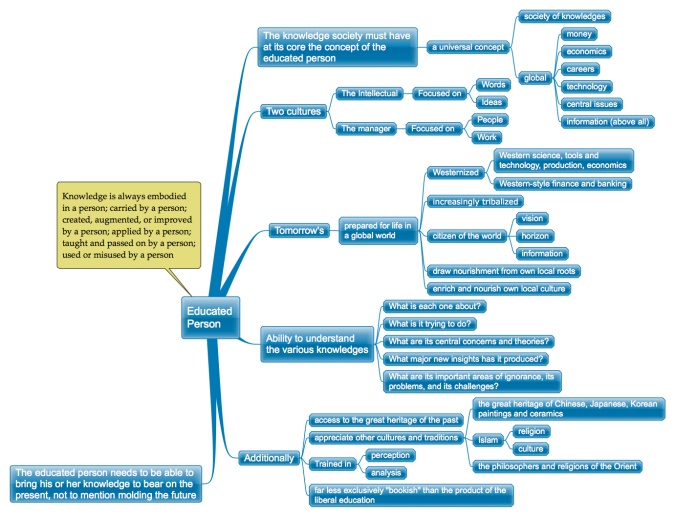
Larger view (outline)

… This is true for all knowledge work.
"Generalists"—and this is what the traditional business enterprise, including the Japanese companies, tried to develop—are of limited use in a knowledge economy.
In fact, they are productive only if they themselves become specialists in managing knowledge and knowledge workers.
This, however, also means that knowledge workers, no matter how much we talk about "loyalty," will increasingly and of necessity see their knowledge area—that is, their specialization rather than the employing organization—as what identifies and characterizes them.
Their community will increasingly be people who share the same highly specialized knowledge, no matter where they work or for whom.
… snip, snip …
… There is as a consequence only one satisfactory definition of management, whether we talk of a business, a government agency, or a nonprofit organization: to make human resources productive.
It will increasingly be the only way to gain competitive advantage.
Of the traditional resources of the economist—land, labor, and capital—none anymore truly confers a competitive advantage.
To be sure, not to be able to use these resources as well as anyone else is a tremendous competitive disadvantage.
But every business has access to the same raw materials at the same price.
Access to money is worldwide.
And manual labor, the traditional third resource, has become a relatively unimportant factor in most enterprises.
Even in traditional manufacturing industries, labor costs are no more than 12 or 13 percent of total costs, so that even a very substantial advantage in labor costs (say a 5 percent advantage) results in a negligible competitive advantage except in a very small and shrinking number of highly labor-intensive industries (e.g., knitting woolen sweaters).
The only meaningful competitive advantage is the productivity of the knowledge worker.
And that is very largely in the hands of the knowledge worker rather than in the hands of management.
Knowledge workers will increasingly determine the shape of the successful employing organizations.
Read more

Take Responsibility for Your Career
The stepladder is gone, and there’s not even the implied structure of an industry’s rope ladder. It’s more like vines, and you bring your own machete.

Q: If a young man in a gray flannel suit represented the life long corporate type, what’s today’s image?
A: Taking individual responsibility and not depending on any particular company.
Equally important is managing your own career.
You don’t know what you’ll be doing next, or whether you’ll work in a private office or one big amphitheater or even out of your home.
You have to take responsibility for knowing yourself, so you can find the right jobs as you develop and as your family becomes a factor in your values and choices.
Remarkably few Americans are prepared to select jobs for themselves.
When you ask, “Do you know what you are good at?
Do you know your limitations?” they look you in the eye with a blank stare.
Or they often respond in terms of subject knowledge, which is the wrong answer.
When they prepare their résumés, they try to list positions like steps up a ladder.
It is time to give up thinking of jobs or career paths as we once did and think in terms of taking on one assignment after another.
We have to leap right over the search for objective criteria and get into the subjective—what I call competencies.
September 9 — The Daily Drucker

From A Century Of Social Transformation:
Two hundred years ago social tasks were being done in all societies by a local community—primarily, of course, by the family.
Very few, if any, of these tasks are being done by the old communities anymore.
Nor would they be capable of doing them, considering that they no longer have control of their members or even a firm hold over them.
People no longer stay where they were born, neither in terms of geography, nor in terms of social position and status.
By definition, a knowledge society is a society of mobility.
And all the social functions of the old communities, whether performed well or poorly (and most were performed very poorly, indeed), presupposed that the individual and the family would stay put.
“The family is where they have to take you in,” said a nineteenth-century adage; and community, to repeat, was fate.
To leave the community meant becoming an outcast, perhaps even an outlaw.
But the essence of a knowledge society is mobility in terms of where one lives, mobility in terms of what one does, mobility in terms of one’s affiliation.
This very mobility means that in the knowledge society, social challenges and social tasks multiply.
People no longer have “roots.”
People no longer have a “neighborhood” that controls where they live, what they do, and indeed, what their “problems” are allowed to be.
The knowledge society, by definition, is a competitive society; with knowledge accessible to everyone, everyone is expected to place himself or herself, to improve himself or herself, and to have aspirations.
It is a society in which many more people than ever before can be successful.
But it is therefore, by definition, also a society in which many more people than ever before can fail, or at least can come in second.
And if only because the application of knowledge to work has made developed societies so much richer than any earlier society could even dream of becoming, the failures, whether poverty or alcoholism, battered women or juvenile delinquents, are seen as failures of society.
In traditional society they were taken for granted.
In the knowledge society they are an affront, not just to the sense of justice, but equally to the competence of society and its self-respect.

From The Individual In Entrepreneurial Society:
One implication of this is that individuals will increasingly have to take responsibility for their own continuous learning and relearning, for their own self-development and for their own careers.
They can no longer assume that what they have learned as children and youngsters will be the “foundation” for the rest of their lives.
It will be the “launching pad”—the place to take off from rather than the place to build on and to rest on.
They can no longer assume that they “enter upon a career” which then proceeds along a pre-determined, well-mapped and well-lighted “career path” to a known destination—what the American military calls “progressing in grade.”
The assumption from now on has to be that individuals on their own will have to find, determine, and develop a number of “careers” during their working lives.
And the more highly schooled the individuals, the more entrepreneurial their careers and the more demanding their learning challenges.

Disintegration
… “But now the traditional axiom that an enterprise should aim for maximum integration has become almost entirely invalidated.
One reason is that the knowledge needed for any activity has become highly specialized.
It is therefore increasingly expensive, and also increasingly difficult, to maintain enough critical mass for every major task within an enterprise.
And because knowledge rapidly deteriorates unless it is used constantly, maintaining within an organization an activity that is used only intermittently guarantees incompetence” — Peter Drucker

The “areas” involved in Managing Oneself can also be found in:
 Developing yourself begins by serving, by striving toward an idea outside of yourself—not by leading. continue Developing yourself begins by serving, by striving toward an idea outside of yourself—not by leading. continue
 Nuggets in The Daily Drucker Nuggets in The Daily Drucker
 The Essential Drucker The Essential Drucker
 Management Challenges for the 21st Century: Managing Oneself: A Revolution in Human Affairs Management Challenges for the 21st Century: Managing Oneself: A Revolution in Human Affairs
 Part X of Management, Revised Edition Part X of Management, Revised Edition
 Knowledge Work As A System Knowledge Work As A System
 Living in More Than One World: How Peter Drucker's Wisdom Can Inspire Your Life by Bruce Rosenstein Living in More Than One World: How Peter Drucker's Wisdom Can Inspire Your Life by Bruce Rosenstein
 Create Your Future the Peter Drucker Way: Developing and Applying a Forward-Focused Mindset by Bruce Rosenstein Create Your Future the Peter Drucker Way: Developing and Applying a Forward-Focused Mindset by Bruce Rosenstein
 Google Free Agent Nation Google Free Agent Nation
 rlaexp.com site search: continuing education rlaexp.com site search: continuing education
 You can't design your life around a temporary organization — Interview: Post-Capitalist Executive from Managing in a Time of Great Change by Peter Drucker You can't design your life around a temporary organization — Interview: Post-Capitalist Executive from Managing in a Time of Great Change by Peter Drucker
 Non-competitive Life and Personal Community (calendarize this?) Non-competitive Life and Personal Community (calendarize this?)
 What do you want to be remembered for? What do you want to be remembered for?
All of the above is suspended in a world moving toward unimagined futures. There is more to know and more to do.
What Executives Should Remember


“If you know the road, life is easier. If you can see the road, life is easier. If you can discover new roads, life is richer. If you know you have a choice of roadS, life is richer.” … more wisdom
To know and not do is to not yet know …
Having alternative mental landscapes is a very good !!! thing … essential competing patterns

Living in an Age of Overlap
... snip, snip ...
A time like this is not comfortable, secure, lazy.
It is a time when tides of history over which he has no control sweep over the individual.
It is a time of agony, of peril, of suffering—an ugly, hateful, cruel, brutish time at best.
It is a time of war, of mass slaughter, of depravity, of mockery of all laws of God or man.
It is a time in which no one can take for granted the world he lives in, the things he treasures, or the values and principles that seem to him so obvious.
Those of us who have been spared the horrors in which our age specializes, who have never suffered total war, slave-labor camp or police terror, not only owe thanks; we owe charity and compassion.
But ours is also a time of new vision and greatness, of opportunity and challenge, to everyone in his daily life, as a person and as a citizen.
It is a time in which everyone is an understudy to the leading role in the drama of human destiny.
Everyone must be ready to take over alone and without notice, and show himself saint or hero, villain or coward.
On this stage the great roles are not written in the iambic pentameter or the Alexandrine of the heroic theater.
They are prosaic—played out in one’s daily life, in one’s work, in one’s citizenship, in one’s compassion or lack of it, in one’s courage to stick to an unpopular principle, and in one’s refusal to sanction man’s inhumanity to man in an age of cruelty and moral numbness.
In a time of change and challenge, new vision and new danger, new frontiers and permanent crisis, suffering and achievement, in a time of overlap such as ours, the individual is both all-powerless and all-powerful.
He is powerless, however exalted his station, if he believes that he can impose his will, that he can command the tides of history.
He is all-powerful, no matter how lowly, if he knows himself to be responsible.

Nothing “post” is permanent or even long-lived.
Ours is a transition period.
What the future society will look like, let alone whether it will indeed be the “knowledge society” some of us dare hope for, depends on how the developed countries RESPOND to the challenges of THIS transition period, the post-capitalist period—their intellectual leaders, their business leaders, their political leaders, but above all each of us in our own WORK and LIFE.
Yet surely this is a time to make the future—precisely because everything is in flux.
This is a time for action Post-Capitalist Society .
Making the future
The memo they don’t want you to see — a brainroad


What are the opportunities time and history have (will) put within your grasp? — Peter Drucker
See expanded version of this topic (WIP and may be deleted later)
TLN Keywords: tlnkwmanagingoneself

|
![]()

![]()